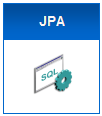Notice: this Wiki will be going read only early in 2024 and edits will no longer be possible. Please see: https://gitlab.eclipse.org/eclipsefdn/helpdesk/-/wikis/Wiki-shutdown-plan for the plan.
Difference between revisions of "Category:JPA"
m (xlink to native orm) |
m |
||
| (3 intermediate revisions by 2 users not shown) | |||
| Line 1: | Line 1: | ||
| + | '''[[Image:Elug_draft_icon.png|Warning]] This page is obsolete. Please see the [http://www.eclipse.org/eclipselink/documentation/ EclipseLink Documentation Center]'' for current information.''' | ||
| + | |||
| + | __NOTOC__ | ||
{| class="wikitable" | {| class="wikitable" | ||
|- | |- | ||
| [[Image:Eclipselink jpa.png]] | | [[Image:Eclipselink jpa.png]] | ||
| − | | This page lists all sections in the ''[[EclipseLink/UserGuide|EclipseLink User's Guide]]'' for '''JPA''' (Java Persistence API) projects. You can also use [[:Category:ORM|EclipseLink's Native ORM support]] to extend JPA. | + | | This page lists all sections in the ''[[EclipseLink/UserGuide|EclipseLink User's Guide 1.x]]'' for '''JPA''' (Java Persistence API) projects. You can also use [[:Category:ORM|EclipseLink's Native ORM support]] to extend JPA. |
|} | |} | ||
| − | [[Category: | + | == Developing Applications using EclipseLink JPA == |
| + | <table width="800" cellpadding="5"> | ||
| + | <tr valign="top"> | ||
| + | <td> | ||
| + | <div style="padding:5px;border:1px solid #000000;width:250px;background:#cff8d9"> | ||
| + | ==Step 1== | ||
| + | Define your persistence units in <tt>persistence.xml</tt>. | ||
| + | </div> | ||
| + | *[[Introduction_to_Java_Persistence_API_(ELUG)#persistence.xml_File|About the persistence.xml file]] | ||
| + | *[[Packaging_and_Deploying_EclipseLink_JPA_Applications_(ELUG)#How_to_Specify_the_Persistence_Unit_Name|Specifying the persistence unit]] | ||
| + | </td> | ||
| + | <td> | ||
| + | <div style="padding:5px;border:1px solid #000000;width:250px;background:#cff8d9"> | ||
| + | ==Step 2== | ||
| + | Annotate classes with @Entity, @Embeddable, and @MappedSuperClass and/or define classes in your mapping file (orm.xml). | ||
| + | </div> | ||
| + | *[[Introduction_to_EclipseLink_JPA_%28ELUG%29#Configuring_an_Entity|Configuring an entity]] | ||
| + | *[[Using_EclipseLink_JPA_Extensions_%28ELUG%29|EclipseLink extensions]] | ||
| + | </td> | ||
| + | <td> | ||
| + | <div style="padding:5px;border:1px solid #000000;width:250px;background:#cff8d9"> | ||
| + | ==Step 3== | ||
| + | Configure your application with: | ||
| + | * javax.persistence.transactionType | ||
| + | * javax.persistence.jtaDataSource | ||
| + | * javax.persistence.nonJtaDataSource | ||
| + | </div> | ||
| + | * [[Developing_Applications_Using_EclipseLink_JPA_%28ELUG%29|Application development]] | ||
| + | *[[Packaging_and_Deploying_EclipseLink_JPA_Applications_%28ELUG%29|Packaging and deployment]] | ||
| + | </td> | ||
| + | </tr> | ||
| + | </table> | ||
| + | |||
| + | |||
| + | [[Category:EclipseLink User's Guide]] | ||
Latest revision as of 12:59, 30 January 2013
![]() This page is obsolete. Please see the EclipseLink Documentation Center for current information.
This page is obsolete. Please see the EclipseLink Documentation Center for current information.

|
This page lists all sections in the EclipseLink User's Guide 1.x for JPA (Java Persistence API) projects. You can also use EclipseLink's Native ORM support to extend JPA. |
Developing Applications using EclipseLink JPA
Step 1Define your persistence units in persistence.xml. |
Step 2Annotate classes with @Entity, @Embeddable, and @MappedSuperClass and/or define classes in your mapping file (orm.xml). |
Step 3Configure your application with:
|
Pages in category "JPA"
The following 10 pages are in this category, out of 10 total.
